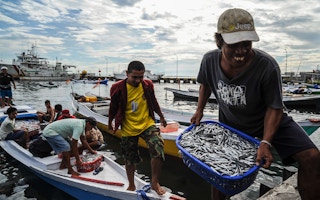Millions of people could lose their livelihoods, food source, and be forced from their homes if the world does not meet the Paris goal to curb global warming which is endangering fish numbers, Canadian researchers said on Wednesday.
A study by the University of British Columbia compared the economic and environmental impact of holding the global average temperature rise to 1.5 degrees Celsius, as agreed in Paris in 2015, versus the current 3.5 degrees warming scenario.
Lead researcher Rashid Sumaila, director of the university’s Fisheries Economics Research Unit, said they found meeting the Paris goal would benefit 75 per cent of maritime countries, with the largest gains in poorer nations, by boosting fish supplies.
Fisheries provide about 260 million full-time and part-time jobs globally with seafood products a critical export for developing nations, according to the study published in the journal Science Advances.
But Sumaila warned that failing to curb global warming could threaten the livelihoods and food source of millions of people.
“
This can turn into a massive crisis as it could cause forced migration not only locally but globally.
Rashid Sumaila, director, Fisheries Economics Research Unit, University of British Columbia
“This can turn into a massive crisis as it could cause forced migration not only locally but globally,” Sumaila told the Thomson Reuters Foundation in a telephone interview.
“A steady supply of fish is essential to support these jobs, food sovereignty, and human well-being.”
Ocean heat - recorded by thousands of floating robots - has been setting records repeatedly over the last decade, with 2018 expected to be the hottest year yet, according to an analysis by the Chinese Academy of Sciences.
The study found the Paris deal would push up the total mass of the top revenue generating fish species globally by 6.5 per cent, with an average increase of 8.4 per cent in the waters of developing countries.
Sumaila said achieving the Paris targets could increase global fishing revenue by $4.6 billion a year.
“The largest gains will occur in developing country waters, such as Kiribati, the Maldives and Indonesia, which are at greatest risks due to warming temperatures and rely the most on fish for food security, incomes and employment,” Sumaila said.
This story was published with permission from Thomson Reuters Foundation, the charitable arm of Thomson Reuters, that covers humanitarian news, climate change, resilience, women’s rights, trafficking and property rights. Visit http://news.trust.org/climate.










